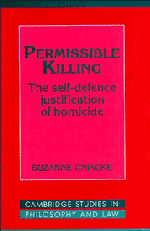Book contents
- Frontmatter
- Contents
- Acknowledgements
- Chapter 1 The problem of homicide in self-defence
- Chapter 2 Self-defence as a justification
- Chapter 3 Self-defence and natural law
- Chapter 4 The Double Effect justification
- Chapter 5 The right of self-defence
- Chapter 6 Self-defence and the right to life
- Bibliography
- Index
Chapter 3 - Self-defence and natural law
Published online by Cambridge University Press: 01 March 2011
- Frontmatter
- Contents
- Acknowledgements
- Chapter 1 The problem of homicide in self-defence
- Chapter 2 Self-defence as a justification
- Chapter 3 Self-defence and natural law
- Chapter 4 The Double Effect justification
- Chapter 5 The right of self-defence
- Chapter 6 Self-defence and the right to life
- Bibliography
- Index
Summary
The moral permissibility of homicide in self-defence has been widely held to be derivable from natural law. Natural law has directly and indirectly shaped much western philosophical thinking about the principles of justified self-defence. Indeed the two major lines of thought about justified self-defence are to be found in natural law accounts. The first of these two lines emphasizes the claimed moral importance of the self-defending agent's intention to the permissibility of homicide in self-defence; the second maintains that the permissibility of self-preference in the case of self-defence derives from the abrogated moral status of an unjust aggressor compared with that of the unoffending victim. I discuss these two general lines of argument in detail in chapters 4 and 5.In this present chapter, I examine a number of influential natural law accounts of self-defence, drawing from these accounts the important details of two strands which correspond to the two lines of argument that I have just mentioned.
Philosophers who argue from natural law emphasize various grounds and conditions of justified self-defence, and they leave open possible, and sometimes reveal actual, differences in the scope and strength of the permission involved. These differences expose important issues which are not, and should not be, confined to natural law justifications of self-defence. These issues must be addressed by any full account of justified self-defence. Not all natural law accounts address all or even most of the issues that I am about to list, nor where they discuss or allude to some do they necessarily do so in the terms which I use. The more important possibilities which these accounts expose can overlap in scope, and even within the groupings listed immediately below are not always mutually exclusive.
- Type
- Chapter
- Information
- Permissible KillingThe Self-Defence Justification of Homicide, pp. 57 - 91Publisher: Cambridge University PressPrint publication year: 1994



